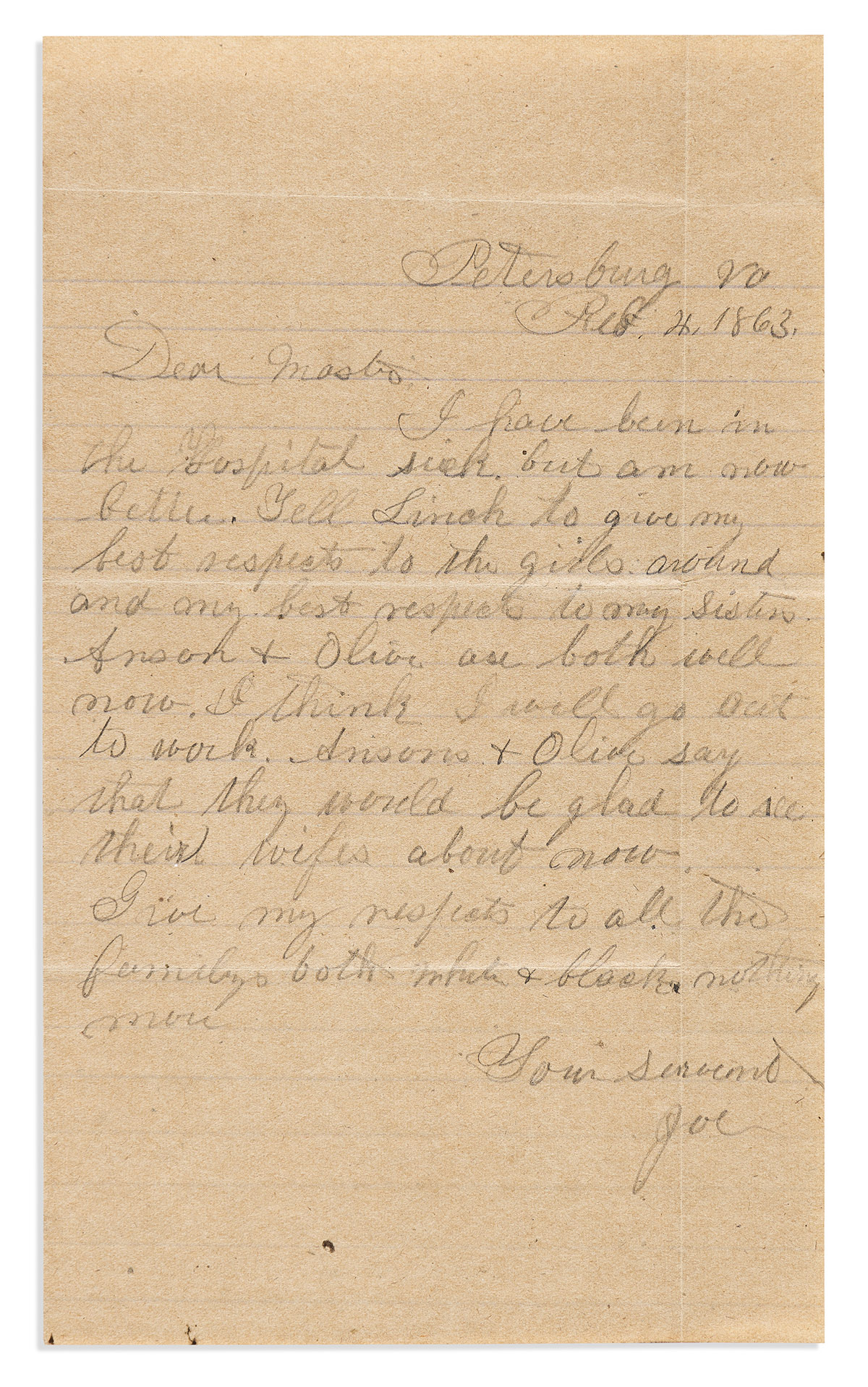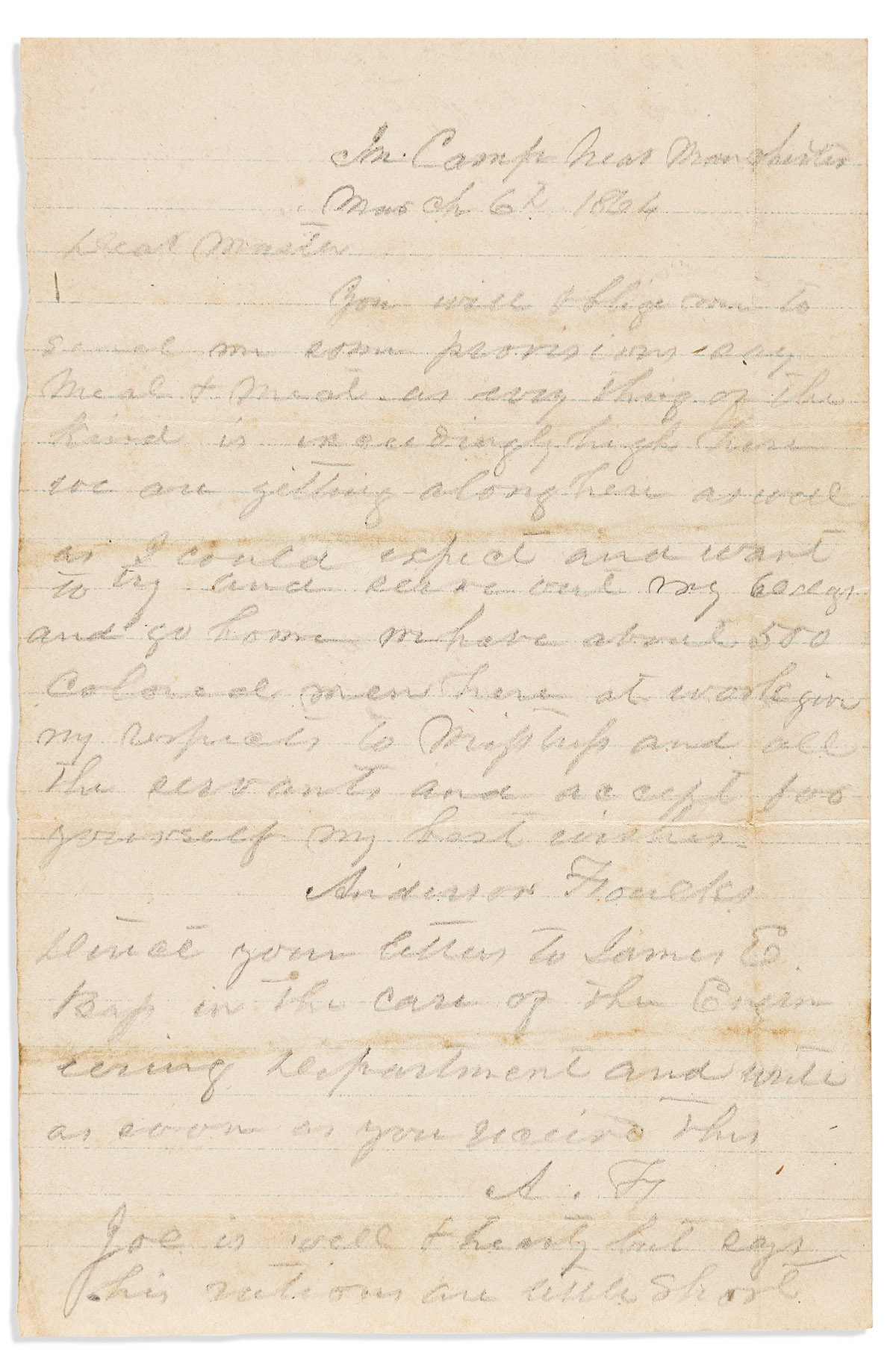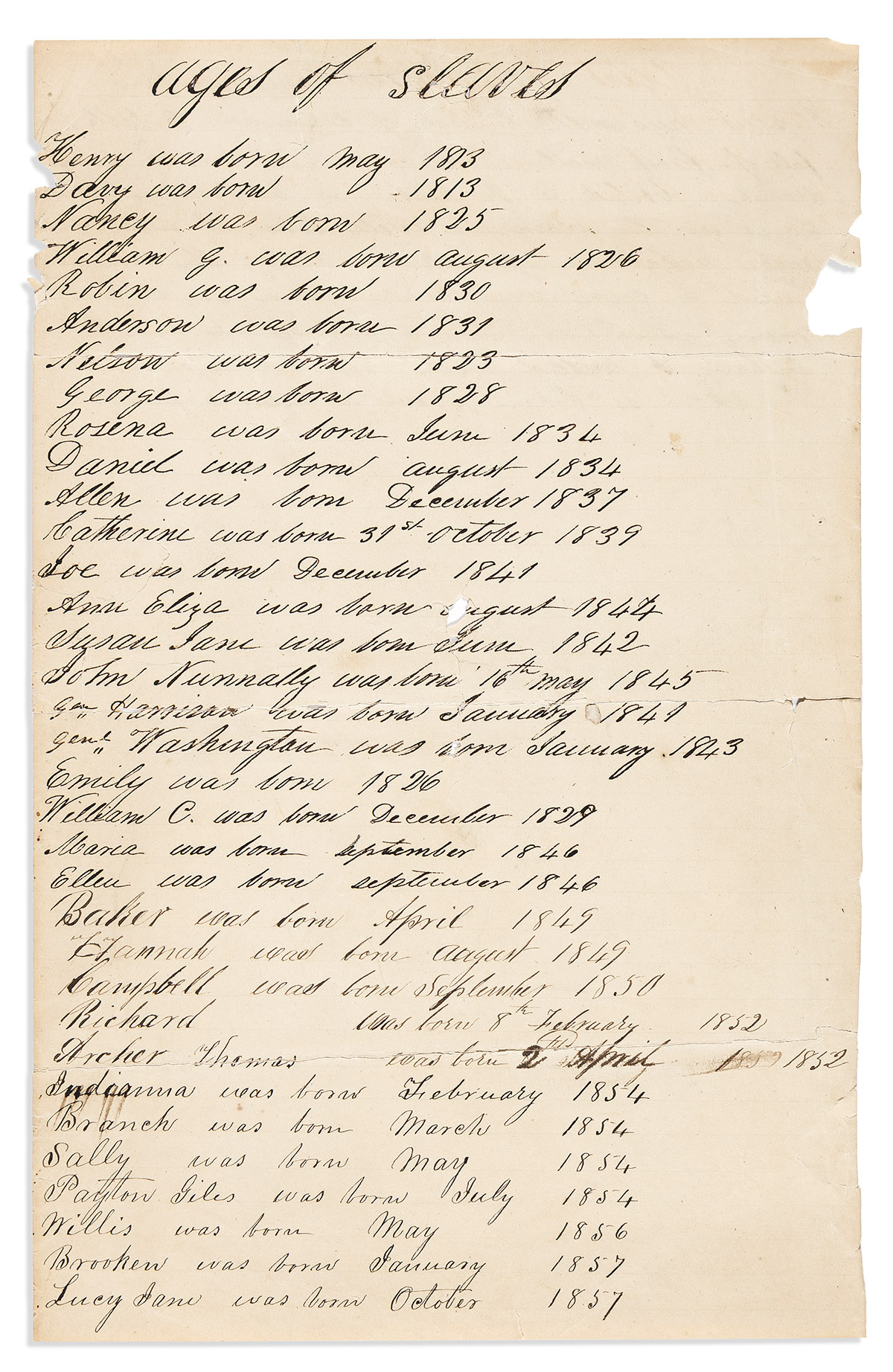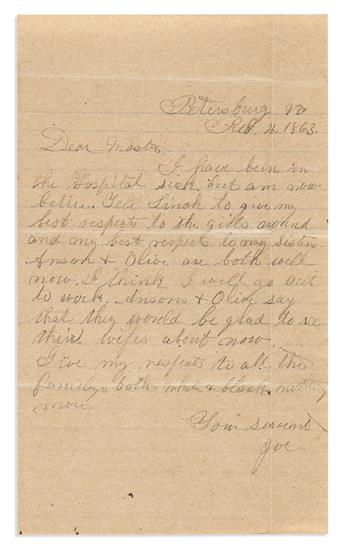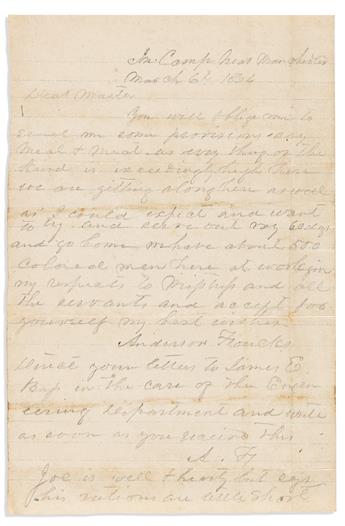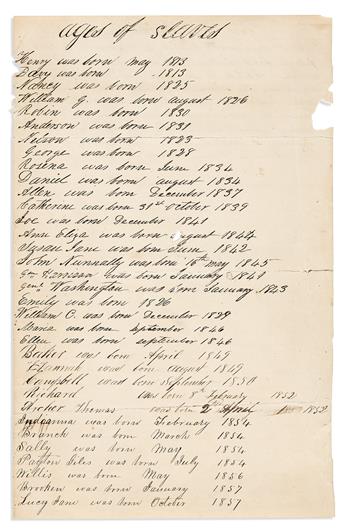Sale 2663 - Lot 421
Price Realized: $ 22,000
Price Realized: $ 27,500
?Final Price Realized includes Buyer’s Premium added to Hammer Price
Estimate: $ 20,000 - $ 30,000
(SLAVERY.) Records of Hyde Park plantation in Virginia, with lists of their enslaved, and letters by enslaved Confederate workers. 5 volumes plus 46 other items (0.4 linear feet) in one box; condition varies. Nottoway County, VA, circa 1794-1936
Additional Details
An enslaved man leased to the Confederacy writes home to his owner: "I don't get enough to eat. Please send me something to eat."
Offered here are family papers of the owners of the Hyde Park plantation in Nottoway County, in south-central Virginia, containing strong documentation of its enslaved people--two lists titled "Ages of Slaves"; three letters home from starving men leased out to the Confederate Army; an overseer's work diary; and more. During this period, Hyde Park was owned by John Hall Fowlkes (1777-1838) and then expanded by his son Paschal Jennings Fowlkes (1813-1882).
The collection contains two farm ledgers, each worn with numerous leaves cut out and additional material added. One covers 1830-1836, and the other 1840-1850 with material sewn or laid in dated 1809-1837.
In the rear of the first ledger is a 10-page diary of a plantation overseer, headed "Employment in 1834," with short daily entries running from 27 January to 25 October 1834. The 20 February entry reads "Strip tobacco, pulling up corn stalks for sowing oats, & cotton stalks out wheat field." On 12 March, "roll logs with 8 hands, 2 E.J. Jeffreys, 2 from A. Hatchett's & 4 from here." On 26 April, worked "untill 11 o'clock, then give the Negroes hollyday."
The second ledger includes 1818 ledger entries for apparent slave labor: "Jim to make shoes for you," and "Bob & doctor for move you." A list titled "Ages of Slaves" gives the names of 6 with their birth months and years, some with family relationships. A list of "expenses for 1847-8-9" lists $3.00 for "Making Negroes clothes, coats."
Also included are several loose papers documenting the family's slave transactions: an 1826 bond for the purchase of "a Negro man named Adam"; another 1835 receipt for the transfer of slaves named Davy, William C., Charly, Amey, Sammy, Anderson, William Perry, Stephen, Martha Jane, and Joe by the estate of Richard Hyde to his children--one of them being Martha Ann Hyde who married Paschal Fowlkes. Another document assesses the 14 slaves owned by the late Thomas Nelson, arranges them into 3 lots of similar value, and distributes them to 3 heirs.
Some of the people enslaved by the Fowlkes family were requisitioned by the Confederate government during the war. The collection includes three letters which they sent home (likely by dictation). The strongest impression that we get from these letters is that the workers were being starved.
On 4 February 1863, Joe wrote from Petersburg, VA: "Dear Master, I have been in the hospital sick, but am now better. Tell Linah to give my best respects to the girls around, and my best respects to my sister. Anson & Olive are both well now. I think I will go out to work. Anson & Olive say that they would be glad to see their wifes about now. Give my respects to all the familys, both white & black. Nothing more. Your servant, Joe."
Joe sent another letter from a camp near Chapin's Bluff, on the northern defenses of Richmond, 11 October 1863: "Dear Master, I write to let you hear from me. I am well, and very well satisfied, only I don't get enough to eat. Please send me something to eat. Tell Eliza to send something too, & Catherine also. Elisha, Master Calvin's man, says tell master Henry Fowlkes to send him something to eat. Says he got down safe and brought all the bundles safe to the boys. Tell all howdy at home. Tell my father's master Liberty Fowlkes Allen to send me some money. Tell Uncle Henry I have not forgotten the promise I made him. I am very anxious to hear you all. Write to me, Master. Direct your letter to Mr. William Hardaway Richmond. All the neighbors' boys are tolerably well. Some of them are complaining, though nothing serious. Joe." This second letter is addressed to Paschal Fowlkes on verso, and bears a Richmond postmark.
A third letter was sent by another enslaved man from a camp near Manchester, 6 March 1864: "Dear Master: you will oblige me to send me some provisions, say meal & meat, as everything of the kind is exceedingly high here. We are getting along here as well as I could expect, and want to try and serve out my 60 days and go home. We have about 500 colored men here at work. Give my respects to Mistress and all the servants, and accept for yourself my best wishes. Anderson Foulks. . . . Joe is well & hearty but says his rations are little short."
These two letter authors are well documented in the other papers. A one-page list titled "Ages of Slaves" lists 34 of them in order of their birth years through 1857 (completely different names than in the similar list mentioned earlier). It shows Anderson as born in 1831, and Joe in December 1841. Also present is a partly printed receipt dated Richmond, 25 September 1863: "received of P.J. Fowlkes, the following slaves, viz: Joe, for work on fortifications at and near this city."
The earliest pieces in the collection are two family manuscript cyphering books kept by young students, circa 1794 and 1800. A family scrapbook of newspaper clippings was compiled circa the 1880s. A few loose items collected after the war testify to the family's nostalgia for the slavery era: an illustrated newspaper clipping on the "Passing of Old Mammy: Old Fashioned Negro Cooks in the South Nearly Gone"; a packet of worn Confederate banknotes; a sheet music cover titled "The Conquered Banner" showing the Confederate flag; a chromolithograhed soap advertisement featuring a portrait of Robert E. Lee; and a later clipping of Lee's famous Farewell Address. A statement dated 1900 regarding the family's Revolutionary War service was signed by Jane Fowlkes, "formerly slave," with her mark. Less easy to explain is the presence of a manuscript transcript of Lincoln's Gettysburg Address. One letter to Paschal Fowlkes dated June 1866 bemoans the loss of slave labor, and hopes for a stricter sharecropping arrangement: "Our situation in regard to having some system of labor is very bad as yet; but I am in hopes it will not be so much longer. They may do better next year, or they may do worse; if the latter, I think they will be forced into measures after a while by starvation."
A clipping of a "Believe it or Not"--type cartoon describes the miracle birth of "Uncle" Mettauer Fowlkes after the death of his enslaved mother. The latest item in the collection is a letter dated 1936 by Mettauer Fowlkes, who had formerly been enslaved by the family. He offered a Fowlkes family member his memories of both her and his family, noting that "I had two aunts, Berta who married Arron Stokes and Martha who married Branch Glen a depot hand at Burkeville when the war ended. I have been married 58 years the 4th of September. We raised 11 children to be grown." It is marked in pencil "this letter is from a colored man."
Offered here are family papers of the owners of the Hyde Park plantation in Nottoway County, in south-central Virginia, containing strong documentation of its enslaved people--two lists titled "Ages of Slaves"; three letters home from starving men leased out to the Confederate Army; an overseer's work diary; and more. During this period, Hyde Park was owned by John Hall Fowlkes (1777-1838) and then expanded by his son Paschal Jennings Fowlkes (1813-1882).
The collection contains two farm ledgers, each worn with numerous leaves cut out and additional material added. One covers 1830-1836, and the other 1840-1850 with material sewn or laid in dated 1809-1837.
In the rear of the first ledger is a 10-page diary of a plantation overseer, headed "Employment in 1834," with short daily entries running from 27 January to 25 October 1834. The 20 February entry reads "Strip tobacco, pulling up corn stalks for sowing oats, & cotton stalks out wheat field." On 12 March, "roll logs with 8 hands, 2 E.J. Jeffreys, 2 from A. Hatchett's & 4 from here." On 26 April, worked "untill 11 o'clock, then give the Negroes hollyday."
The second ledger includes 1818 ledger entries for apparent slave labor: "Jim to make shoes for you," and "Bob & doctor for move you." A list titled "Ages of Slaves" gives the names of 6 with their birth months and years, some with family relationships. A list of "expenses for 1847-8-9" lists $3.00 for "Making Negroes clothes, coats."
Also included are several loose papers documenting the family's slave transactions: an 1826 bond for the purchase of "a Negro man named Adam"; another 1835 receipt for the transfer of slaves named Davy, William C., Charly, Amey, Sammy, Anderson, William Perry, Stephen, Martha Jane, and Joe by the estate of Richard Hyde to his children--one of them being Martha Ann Hyde who married Paschal Fowlkes. Another document assesses the 14 slaves owned by the late Thomas Nelson, arranges them into 3 lots of similar value, and distributes them to 3 heirs.
Some of the people enslaved by the Fowlkes family were requisitioned by the Confederate government during the war. The collection includes three letters which they sent home (likely by dictation). The strongest impression that we get from these letters is that the workers were being starved.
On 4 February 1863, Joe wrote from Petersburg, VA: "Dear Master, I have been in the hospital sick, but am now better. Tell Linah to give my best respects to the girls around, and my best respects to my sister. Anson & Olive are both well now. I think I will go out to work. Anson & Olive say that they would be glad to see their wifes about now. Give my respects to all the familys, both white & black. Nothing more. Your servant, Joe."
Joe sent another letter from a camp near Chapin's Bluff, on the northern defenses of Richmond, 11 October 1863: "Dear Master, I write to let you hear from me. I am well, and very well satisfied, only I don't get enough to eat. Please send me something to eat. Tell Eliza to send something too, & Catherine also. Elisha, Master Calvin's man, says tell master Henry Fowlkes to send him something to eat. Says he got down safe and brought all the bundles safe to the boys. Tell all howdy at home. Tell my father's master Liberty Fowlkes Allen to send me some money. Tell Uncle Henry I have not forgotten the promise I made him. I am very anxious to hear you all. Write to me, Master. Direct your letter to Mr. William Hardaway Richmond. All the neighbors' boys are tolerably well. Some of them are complaining, though nothing serious. Joe." This second letter is addressed to Paschal Fowlkes on verso, and bears a Richmond postmark.
A third letter was sent by another enslaved man from a camp near Manchester, 6 March 1864: "Dear Master: you will oblige me to send me some provisions, say meal & meat, as everything of the kind is exceedingly high here. We are getting along here as well as I could expect, and want to try and serve out my 60 days and go home. We have about 500 colored men here at work. Give my respects to Mistress and all the servants, and accept for yourself my best wishes. Anderson Foulks. . . . Joe is well & hearty but says his rations are little short."
These two letter authors are well documented in the other papers. A one-page list titled "Ages of Slaves" lists 34 of them in order of their birth years through 1857 (completely different names than in the similar list mentioned earlier). It shows Anderson as born in 1831, and Joe in December 1841. Also present is a partly printed receipt dated Richmond, 25 September 1863: "received of P.J. Fowlkes, the following slaves, viz: Joe, for work on fortifications at and near this city."
The earliest pieces in the collection are two family manuscript cyphering books kept by young students, circa 1794 and 1800. A family scrapbook of newspaper clippings was compiled circa the 1880s. A few loose items collected after the war testify to the family's nostalgia for the slavery era: an illustrated newspaper clipping on the "Passing of Old Mammy: Old Fashioned Negro Cooks in the South Nearly Gone"; a packet of worn Confederate banknotes; a sheet music cover titled "The Conquered Banner" showing the Confederate flag; a chromolithograhed soap advertisement featuring a portrait of Robert E. Lee; and a later clipping of Lee's famous Farewell Address. A statement dated 1900 regarding the family's Revolutionary War service was signed by Jane Fowlkes, "formerly slave," with her mark. Less easy to explain is the presence of a manuscript transcript of Lincoln's Gettysburg Address. One letter to Paschal Fowlkes dated June 1866 bemoans the loss of slave labor, and hopes for a stricter sharecropping arrangement: "Our situation in regard to having some system of labor is very bad as yet; but I am in hopes it will not be so much longer. They may do better next year, or they may do worse; if the latter, I think they will be forced into measures after a while by starvation."
A clipping of a "Believe it or Not"--type cartoon describes the miracle birth of "Uncle" Mettauer Fowlkes after the death of his enslaved mother. The latest item in the collection is a letter dated 1936 by Mettauer Fowlkes, who had formerly been enslaved by the family. He offered a Fowlkes family member his memories of both her and his family, noting that "I had two aunts, Berta who married Arron Stokes and Martha who married Branch Glen a depot hand at Burkeville when the war ended. I have been married 58 years the 4th of September. We raised 11 children to be grown." It is marked in pencil "this letter is from a colored man."
Exhibition Hours
Exhibition Hours
Aliquam vulputate ornare congue. Vestibulum maximus, libero in placerat faucibus, risus nisl molestie massa, ut maximus metus lectus vel lorem.



